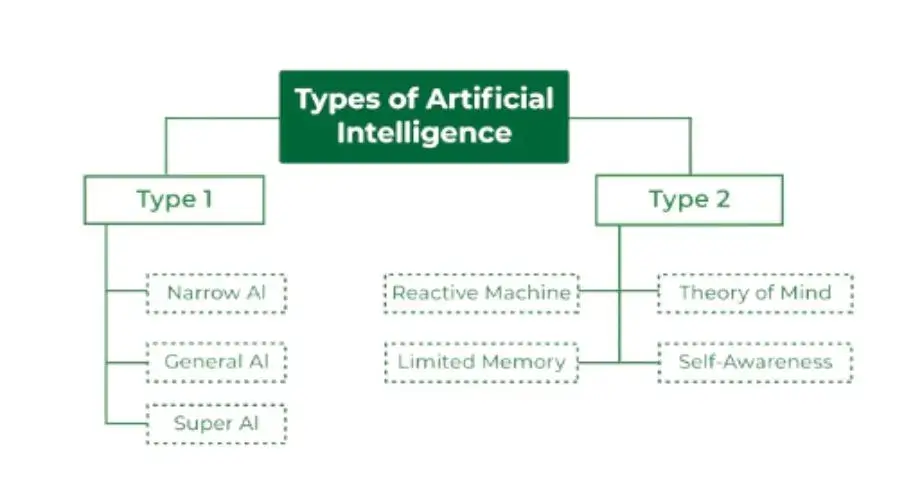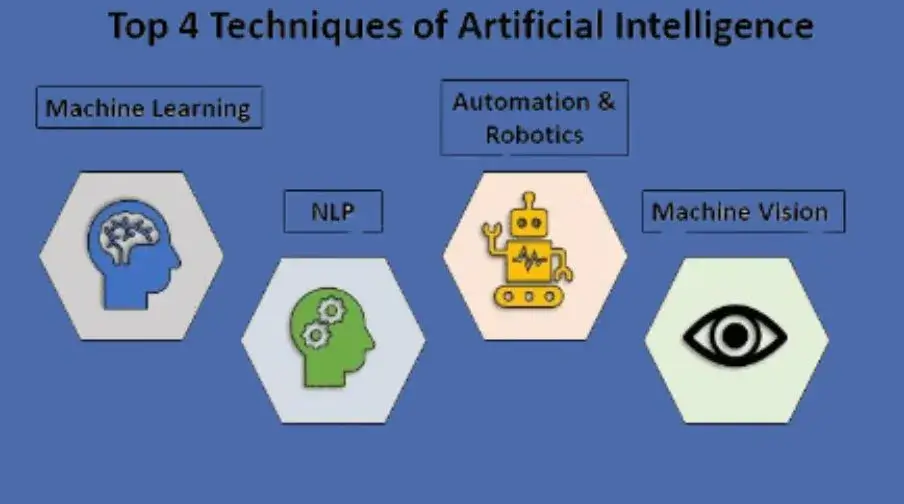Artificial Intelligence is a system that evolves with machines and computers. It’s a technology that simulates human power to compete and correlate with machines, offering a promising future of innovation and advancement. AI uses multiple technologies to plan, act, and set them with human technology, paving the way for exciting possibilities.
Furthermore, AI systems commit and perceive systems to arrange and solve problems. They provide an environment, check objects, and are involved in decision-making. Therefore, artificial technology is a good combination of multiple systems that work like humans.
AI systems increase with their diverse types, like machine learning, data processing, language processing, and computer settings processing. Hence, these different technologies can correlate from example to work efficiently.
AI is a vast field that has many different disciplines. But it includes computer science, data analytics and statistics, and hardware and software engineering. It also provides linguistics, neuroscience, philosophy, and psychology.
Types Of Artificial Intelligence
It is also good to know the types of AI and its stages. These types are based on capabilities, functions, and techniques. Therefore, we first discuss types based on capabilities.

AI Types On Capabilities Base
Narrow AI
Narrow AI, also known as small AI, is a type of artificial Intelligence designed and set to perform a specific range of tasks. Unlike General AI, which aims to replicate human cognitive abilities across various domains, Narrow AI optimizes performance in well-defined areas. Here are some key features and examples:
- Focus on a single task and excel with a narrow system
- Use A short-tailored system to solve problems specific to it
- It has a limited scope to use and cannot adopt new functions that need reprogramming
- Performance depends on data quantity and quality
- More data and better algorithms give an improved efficiency level
- Does not learn all experience for future examining test
General AI
General AI, also known as strong AI, is a part of artificial Intelligence that can help people learn and gain knowledge in various tasks, much like humans. Unlike narrow AI, designed for specific tasks, general AI can adapt to new situations and solve unfamiliar problems without human intervention, inspiring us with its adaptability and potential.
General AI remains a theoretical concept that has yet to be implemented. Its development poses significant technical and ethical challenges, including ensuring safety, controlling its actions, and aligning its objectives with human values.
Features Of General AI
- Power to understand, learn, and apply knowledge across various tasks and domains
- Exhibits reasoning, problem-solving, and abstract thinking similar to human cognition
- Continuously learns and improves from experiences, much like humans do.
- Operates independently without requiring constant human guidance or specific programming for each task
- Possesses understanding and interpretation of human emotions, social cues, and cultural contexts
Super AI
Super AI, also known as Artificial Superintelligence (ASI), refers to a level of artificial Intelligence that becomes human Intelligence in all aspects, including creativity, general wisdom, and problem-solving.
Super AI, also known as Artificial Superintelligence (ASI), refers to a level of artificial Intelligence that becomes human Intelligence in all aspects, including creativity, general wisdom, and problem-solving. It would outperform humans in every field, from scientific research to social skills, and possess capabilities far beyond the most talented human minds, inspiring awe with its potential.
Features
- Possesses Intelligence far beyond human capabilities in all domains
- It includes scientific reasoning, artistic creativity, and strategic planning.
- Continuously improves its algorithms and capabilities without human intervention.
- Super AI leads to rapid and exponential growth in Intelligence.
- Exhibits an advanced understanding of human emotions, social dynamics, and ethical system
- Makes independent decisions with a high degree of accuracy and foresight
Types of AI Based on Technique

Machine Learning
Machine learning is a part of AI that makes algorithms that adept computers can use to check from and make data-based decisions. It involves training models using large datasets to find patterns and make informed decisions without explicit programming. Typical applications include spam filters, recommendation systems, and predictive analytics.
Deep AI Learning
Deep learning is a set of machine learning neural networks with many partitions that analyze various data factors. These networks can automatically discover representations needed for feature detection or classification from raw data. It excels in image and speech recognition, natural language processing, and autonomous driving.
Natural Language Processing
Natural Language Processing is an AI field focusing on the interaction between computers and humans through natural language. It enables machines to understand, interpret, and generate human language meaningfully and usefully. Applications include chatbots, translation services, and voice-activated assistants.
Robotics
Robotics combines AI with mechanical engineering to create intelligent machines adept at performing tasks autonomously or semi-autonomously. These machines can range from industrial robots used in manufacturing to service robots in healthcare and domestic environments. AI enables these robots to navigate, perceive their environment, and make decisions.
Expert Systems
Expert Systems are AI programs that mimic the decision-making abilities of a human expert. They use a set of rules derived from expert knowledge to solve specific problems within a particular domain. So, they provide expert-level solutions and advice commonly used in medical diagnosis, financial planning, and troubleshooting technical issues.
Benefits of Artificial Intelligence
It is essential to know the benefits of AI. Therefore, we have briefly described some significant advantages of using AI tools. The considerable benefits of Narrow, General, and Super AI are collected for use.
Increased Efficiency
AI systems can process large amounts of data quickly and perfectly, leading to significant improvements in efficiency. They can automate the same tasks, reduce human error, and handle complex calculations, which help organizations save time and resources. For example, AI-powered automation in manufacturing can streamline production processes and enhance productivity.
Enhanced Decision-Making
AI provides valuable insights through data analysis, helping businesses and individuals make more informed decisions. By finding patterns and trends in large datasets, AI can predict outcomes and recommend optimal courses of action. In finance, AI-driven analytics can forecast market trends and inform investment strategies.
Personalization
AI is used to create personalized experiences by analyzing individual preferences and behaviors. This is vast in reactive methods used by perfect services, online retailers, and social media platforms, which suggest content or products tailored to each user’s tastes. Personalization enhances user satisfaction and engagement by delivering relevant and appealing options.
Improved Healthcare
AI can improve healthcare by providing more accurate diagnostics, personalized treatment plans, and efficient medical record management. AI algorithms can analyze medical images, predict disease progression, and identify potential health risks early on. In addition, AI-powered tools assist in drug discovery and development, accelerating the creation of new treatments.
Makes Customer Service
AI-driven chatbots and virtual assistants improve customer service by instantly responding to queries and resolving issues efficiently. These AI tools can simultaneously handle many interactions, offering 24/7 support and freeing the human system to focus on more complex tasks. As a result, businesses can increase customer roles and reduce operational costs.
Artificial Intelligence Applications And Relation System
Artificial Intelligence (AI) has various applications across various fields. Here are some key areas:
Healthcare
AI enhances medical diagnostics by analyzing patient data and improving disease detection accuracy and speed. It aids in personalized treatment plans and managing patient records and can even assist in surgery through robotic systems.
Finance
AI powers algorithmic trading, fraud detection, and personalized banking in finance. AI systems can quickly analyze a vast amount of financial data, predicting market trends and providing insights for better investment decisions.
Customer Service
AI-driven chatbots and virtual assistants boost customer service by responding instantly and handling routine inquiries. This technology improves efficiency and customer satisfaction while reducing the workload on human agents.
Transportation
AI is critical in autonomous vehicles, optimizing routes, and traffic management. It enhances safety and efficiency in logistics and public transportation systems through predictive maintenance and demand forecasting.
Retail
AI transforms retail by personalizing shopping experiences, managing inventory, and optimizing supply chains. It uses data analysis to predict consumer behavior and preferences, enhancing marketing strategies and customer engagement.
Education
AI offers personalized learning experiences, automates administrative tasks, and provides innovative educational content and tutoring systems. It adapts to individual learning styles, helping students achieve better outcomes.
Manufacturing
Artificial Intelligence improves manufacturing processes through predictive maintenance, quality control, and supply chain optimization. It enables intelligent factories with automated production lines, increasing efficiency and reducing downtime.
Entertainment
Artificial Intelligence revolutionizes entertainment by personalizing content recommendations, generating music and art, and enhancing special effects in movies and video games. It also powers virtual and augmented reality experiences.
Agriculture
Artificial Intelligence assists in precision farming by analyzing soil and crop data, optimizing planting and harvesting schedules, and managing resources efficiently. It helps in pest detection and weather prediction, improving crop yields.
Cybersecurity
Artificial Intelligence (AI) enhances cybersecurity by identifying and responding to threats in real time. It analyzes patterns to detect anomalies and potential breaches, providing a proactive approach to protecting digital assets.
How Does Artificial Intelligence Work?
Artificial Intelligence (AI) simulates human intelligence processes using algorithms, data, and computational power. At its core, AI systems utilize machine learning, where algorithms learn from large datasets to identify patterns and make decisions.
This learning process involves training a model on a dataset, allowing it to adjust its parameters and improve accuracy over time. For example, AI systems analyze numerous labeled images in image recognition to learn distinguishing features and correctly identify objects in new photos.
Deep Learning, a subsystem of machine learning, uses a neural system with multiple layers to process data hierarchically. Each layer extracts increasingly complex features from the input data, enabling the AI to understand and interpret intricate patterns.
Natural language processing (NLP) allows AI to comprehend and generate human language, facilitating applications like chatbots and translation. Reinforcement learning, another essential technique, enables AI systems to learn through trial and problems and boost actions based on feedback from the environment.
Conclusion
Artificial Intelligence is a transformative technology miming human cognitive functions to perform tasks and make decisions. While its applications offer significant benefits across various sectors, it also raises ethical concerns that need careful consideration. As AI evolves, balancing innovation with ethical responsibility will be crucial in harnessing its full potential while minimizing risks.
Frequently Asked Question
What Is Artificial Intelligence (AI)?
Artificial Intelligence (AI) is the sense of human Intelligence in machines programmed to think, learn, and perform tasks that typically require human Intelligence. So this includes problem-solving, understanding natural language, and recognizing patterns.
How Does AI Work?
AI uses algorithms and computational models to process data and make decisions. Machine learning, a subset of AI, involves training models on large datasets to improve their accuracy over time. AI systems can get from experience and use their settings based on new information.
What Are Some Common Applications Of AI?
AI is used in various fields, including healthcare (for diagnosing diseases), finance (for fraud detection), autonomous vehicles (for navigation and safety), and customer service (through chatbots). It also powers virtual assistants like Siri and Alexa.
What Are The Different Types Of AI?
AI has three types: narrow AI, which is designed for specific tasks (e.g., facial recognition); general AI, which aims to perform any intellectual task that a human can do (still theoretical); and Artificial Superintelligence, which surpasses human Intelligence (a future possibility).
What Are The Ethical Concerns Surrounding AI?
Ethical concerns include privacy issues, as AI can process large amounts of personal data, and bias, where AI systems may inadvertently perpetuate existing prejudices. There are also concerns about job displacement as AI automates tasks and the need for regulations to ensure responsible use.






